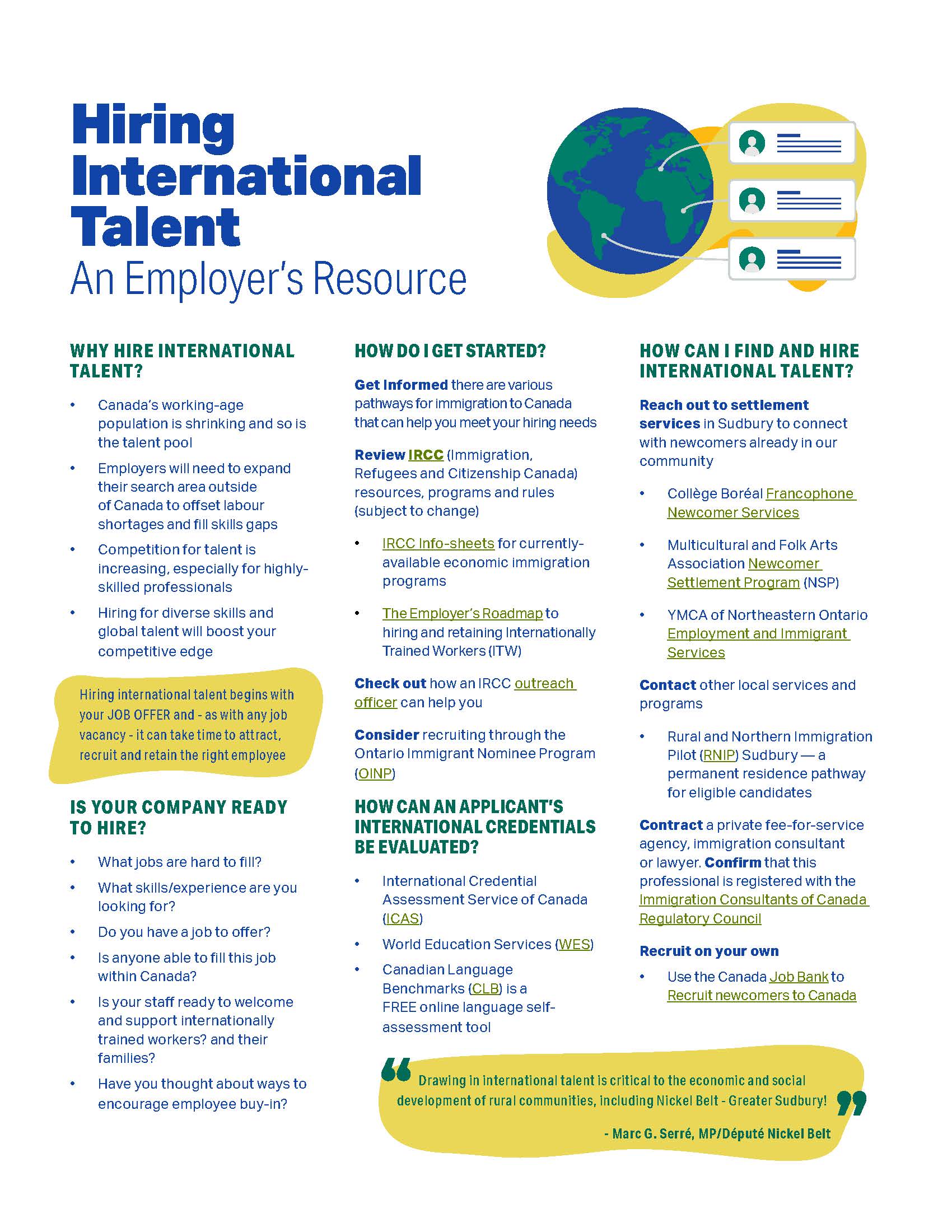Employment Ontario
Free employer and employment services are available from Employment Ontario through the Ministry of Labour, Immigration, Training and Skills Development. Employment Ontario provides a wide range of services for employers, Human Resources (HR) professionals and job-seekers.
Services for Employers and HR Professionals:
As an Employer or HR Professional, it helps to be aware of the many resources and incentives that are available when it comes to hiring and training.
Employment Ontario services include:
- Free job postings and HR services;
- Work placements, follow up and support;
- Information on incentives, wage subsidies and tax credits such as:
Services for Job-Seekers:
In 2019 – 2020, Employment Ontario Service Providers helped 183,826 people in Ontario find a job. Here is what they offer:
Employment Resource Centre: up-to-date job postings; resume/cover letter development; computer workstations (with free internet access); faxing; photocopying; telephone access (including long-distance); information, education and career development resources; information sessions; workshops and referrals to other local services (such as literacy services).
Job Search and Career Planning: one-on-one employment consulting and job search support; resume/cover letter development and interview preparation; Second Career and other government funded programs; and access to assistive devices and workplace accommodations.
Job Bank
There are various websites available to help job-seekers and employers. However, for employers, posting a vacant position can be costly. Free service is available through the Job Bank, which is sponsored by the Government of Canada. As an employer, you can advertise your job vacancy at no cost, review profiles of job-seekers matching your requirements and increase the visibility of your company.
Employment Legislation
All employers large and small are bound by employment legislation. Here are some important links:
![]() Ministry of Labour, Immigration, Training and Skills Development – Employment Standards
Ministry of Labour, Immigration, Training and Skills Development – Employment Standards
![]() Ministry of Labour, Immigration, Training and Skills Development – Health and Safety
Ministry of Labour, Immigration, Training and Skills Development – Health and Safety
![]() AODA (Accessibility for Ontarians with Disabilities Act)
AODA (Accessibility for Ontarians with Disabilities Act)
Labour Market Information (LMI) and Research
Understanding the local labour market is critical. Research and current data combined with key stakeholder consultations helps us answer questions such as:
- What industries are growing or declining?
- What occupations are in demand?
- Is there a skills shortage?
- Where is the projected growth?
- Who is training our future workforce?
It also helps us to identify trends, training needs and opportunities for workforce development and economic growth. Every year, Workforce Planning for Sudbury and Manitoulin (WPSM) prepares a local labour market report to capture what is happening in our local economy.
Replacement demand represents nearly
%
of all projected job openings over the coming decade
Source: Statistics Canada
Hiring an Apprentice
There are 144 trades in Ontario. Many employers rely on the trades, and certified journeypersons are critical to the success of many businesses. Many journeypersons are close to an age when they can retire. By hiring an apprentice, as an employer you are not only investing in your business and enhancing/protecting profitability, but recruiting, training and retaining highly skilled talent for the future.
![]() Hire an Apprentice – Find out more
Hire an Apprentice – Find out more
![]() Becoming a Tradesperson in Ontario – Find out more
Becoming a Tradesperson in Ontario – Find out more
![]() Hiring an Apprentice Made Easy – Find out more
Hiring an Apprentice Made Easy – Find out more
![]() Promoting apprenticeships: Find your passion – find your skilled trade
Promoting apprenticeships: Find your passion – find your skilled trade
Sudbury and Manitoulin Districts
(June 2018)
Registered Journeypersons
Apprentices
Ontario College of Trades (OCoT)
The Ontario College of Tades is winding down as the government takes action to modernize the skilled trades and apprenticeship system.
Information on this website is moving to Ontario.ca. Visit the Ontario government’s new Skilled Trades page for more information and resources.
Literacy and Basic Skills
Various skills such as reading, writing, math and computer proficiency are essential for employment and to fully participate in society. Employment Ontario offers programs to assist with education, skills training and work. Literacy and Basic Skills (LBS) programs help adults reach their goals by developing and/or strengthening some of these skills.
For more information on the network of services available across northern Ontario and the programs they offer:
![]() Literacy and Basic Skills (LBS)
Literacy and Basic Skills (LBS)
Succession Planning
A recent Oraclepoll survey of local businesses conducted by the Sudbury Chamber of Commerce found that:
- 51% of business owners who responded have no succession plan in place;
- 48% plan to retire or leave their business within the next 10 years; and
- 79% of former business owners who did not have a plan, shut their doors completely.
Succession planning means different things to different people. From an HR perspective, succession planning helps you identify, train and mentor key employees to fill key positions in future. This helps you keep good employees and maintain the smooth operation of your business, even if you do sell. From a business succession perspective, it means getting the best value for your business when you leave (retire, sell, hand it over or are unable to run the business due to injury, illness or death).
A good succession plan can take years to develop, but can help to protect your business investment, your family and even your employees.
Designated Groups
Immigrants and Newcomers

Employers are increasingly looking for trained and skilled immigrants and newcomers to meet growing job demand. However, immigrant retention rates in northern Ontario continue to be low.
Here are a few local resources and services that assist immigrants and newcomers with getting settled and finding work:
Persons with Disabilities

Approximately 15% of Ontarians have a disability. According to Statistics Canada, in 2012, the participation rate in the labour force for those with a disability between 15-65 years of age was around 52% and the employment rate was 45.5%. However, their unemployment rate was 13.7% which is higher than those without a disability.
Indigenous Peoples

Services and resources are available throughout the Sudbury and Manitoulin Districts to support Indigenous peoples with culturally focussed education, skills development and employment assistance. Many of these services also offer assistance to employers who are interested in hiring Indigenous peoples.

